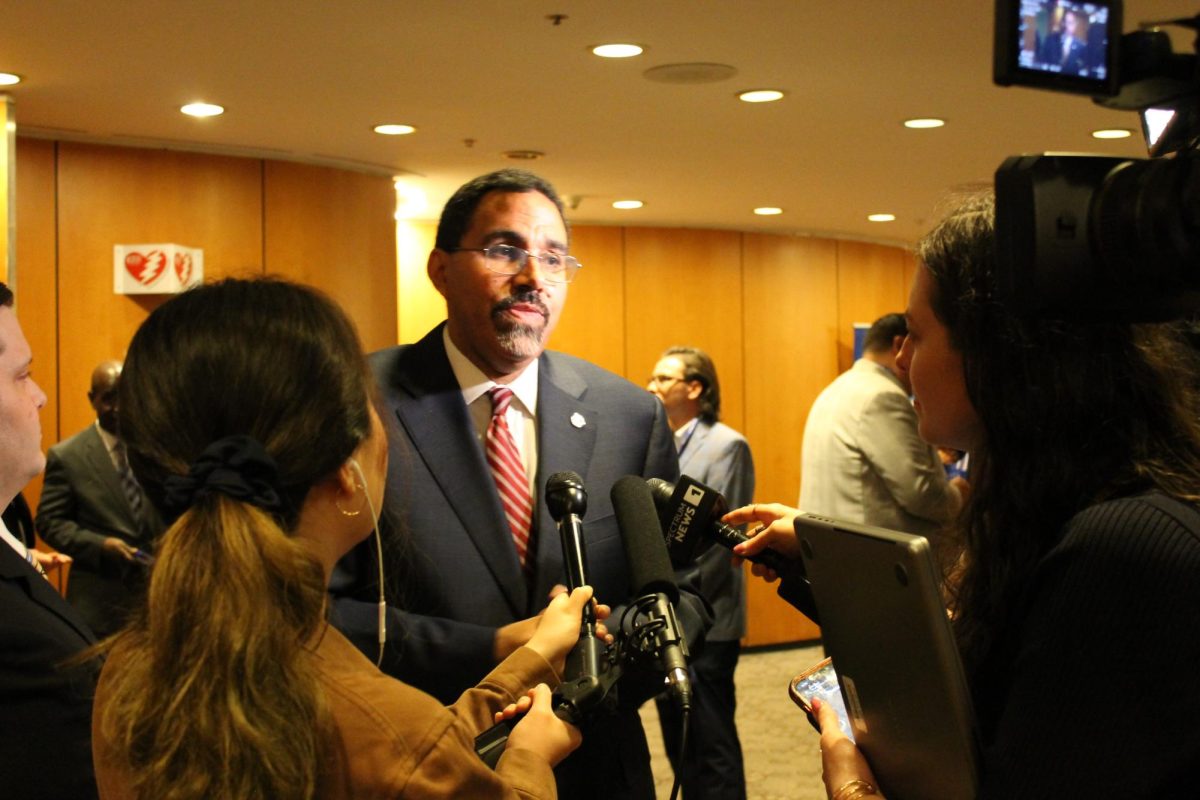In February The NEST Editor-In-Chief had the opportunity to interview Chancellor King. Chancellor King is the Chancellor of the SUNY system. Chancellor King has had a long and distinguished career in education, operating at, and more importantly experiencing all levels of education. King has been a teacher, NYS Education Commissioner, president of the Education Trust, currently he serves as the 15th SUNY Chancellor, and he was the U.S. Secretary of Education under Obama from 2015 to 2016. The topic of our discussion was the university system’s latest initiatives and his vision for the future, touching on student success, research, diversity, economic development, affordability, and sustainability.
The first topic I brought up was student success initiatives, asking, “How is the SUNY Top 10% Promise Program, launched in October 2024, impacting student enrollment and diversity?” In response, King said that this is the first year of its launch, however, they are getting good reception from the pilots that are working with them this year, and next year they hope to see it be rolled out across all districts. The administration expects to see in higher needs districts that students who didn’t think they could get into a more selective suny, hopefully will see that there is a clear path for them because of how well they’ve done academically. King hopes that this brings students to choose college most importantly, but also to choose a SUNY.
After that, I brought up the topic of research & innovation, asking, “Can you discuss SUNY’s role in advancing research in emerging fields like semiconductor technology and microelectronics?” King explained that SUNY is a national leader in research, having about $1.1-1.2 billion dollars of sponsored research each year across the SUNY system. This includes different areas of strength across the campus’, including Albany Nano-tech which is the nation leading research facility for the semiconductor industry. Albany Nano-tech was just awarded a major CHIPS grant, which will transform into $825 million dollars to support Albany Nano-tech being one of the national centers for the semiconductor industry. On top of that, Binghamton is doing nation leading work on battery technology, with support from a National Science Foundation’s Regional Innovations Engines Grant that could translate to $15 million dollars in support for research in battery tech. Additionally, Stony Brook is doing incredible work on Quantum technology, being a leading institution for a project to build a climate resilience campus on Governors Island. This project aims to focus on research connected to climate change and climate resilience. Last but not least, the University of Buffalo has an incredible track record with research on AI, being home to a $400 million dollar AI initiative to invest in AI research. The SUNY system is also doing a ton of research with health sciences across all four of university centers. In response, I said, “It’s so great to hear that all that money is being put in such great programs.” King responded by saying, “Yes, and we have to work to protect it. There are some folks who would like to touch investments in research at the federal level but we are working hard to make sure we protect those investments.”
Next, I brought up diversity, equity, & inclusion, asking, “What progress has been made on SUNY’s 25-point Action Plan to close racial equity gaps since its implementation?” Initially, King responded by saying, “Diversity, equity and inclusion is something we are always working towards at SUNY, because they are foundational to our mission…When SUNY was founded, a core part of our mission was to make sure we provide opportunity for all New Yorker’s in all parts of the state from every background, and were very committed to that.” King explained that SUNY’s student body continues to grow more diverse, and becomes evermore reflective of the state of New York. This includes serving a significant percentage of students who are eligible for aid, creating a socioeconomically diverse environment as well as racial diverse. The SUNY system is working to ensure people from all backgrounds have the opportunity to become part of the faculty of SUNY. Part of this initiative includes the PRODiG+ program, which helps identify faculty members in the postdoc period, who have finished their PhD and demonstrate commitment to the value of inclusion. These members are selected for postdoc, and if they finish and do well, they are guaranteed a tenured position. This is really a fantastic way to build a pipeline of future faculty who are committed to work on inclusion. SUNY has a 25 point action plan, and through this they are committed to making sure every campus has a senior leader who is focused on issues of belonging and monitoring values of diversity, equity, and inclusion. King summed up his thoughts by saying, “But, there is always more to do, because we want to make sure that every New Yorker knows there’s a place for them at SUNY, and that every student feels that they are supported and like they belong.”
Additionally, I brought up economic development, asking, “How is SUNY contributing to New York’s $300 million investment in creating power-ready sites for new businesses?” King responded, “Economic development is a core part of the work we do at SUNY, and so part of that is the work we do to prepare the workforce of tomorrow.” The SUNY’s run the EOC’s, where students have opportunities to gain short term career credentials to get into jobs. SUNY is working on all levels to provide pathways into careers. Additionally, SUNY runs small business development centers throughout the state that work with new business, including startups to help them navigate the process of getting their business started. Finally, a number of research projects that are closely tied to growth areas in the economy, like semiconductors, batteries, renewable tech, and companies that are pursuing biotech and health science research.


